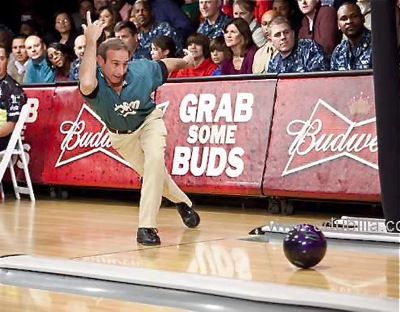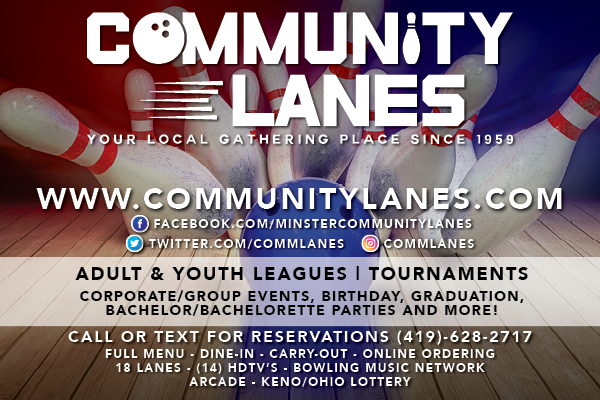
“I don’t bowl for the income, anymore,” says tour veteran D.J. Archer. “I bowl for the competition and because I enjoy being out here.” (Press Pros Feature Photos)
Their professionalism and skills are on par with what you see on the golfers’ tour. But the difference in image, marketing, and money is a world apart. Another reason to appreciate the pros…on the Professional Bowlers Tour this week in Minster.
 Minster, OH – A couple of summers ago at Scioto Downs, in Columbus, I asked Chris Page, one of the brightest stars in standard bred horse racing…why so much difference in the image of harness racing and that of thoroughbreds.
Minster, OH – A couple of summers ago at Scioto Downs, in Columbus, I asked Chris Page, one of the brightest stars in standard bred horse racing…why so much difference in the image of harness racing and that of thoroughbreds.

Editor and publisher Sonny Fulks writes OHSAA and Ohio State sports for Press Pros Magazine.
“Simple,” said Page, who had the time had won 6,500 races in his career, and by the ripe old age of 39. “Money…money…and money. Our sport doesn’t have the corporate backing that the thoroughbreds have. And we aren’t marketed. We need more media coverage, like there used to be.”
Page grew up in central Ohio, in Mount Vernon, and fully understands the difference in attention given to Ohio State football compared to professional harness racing at Scioto Downs.
There was a time when the Dispatch wrote about racing every day,” he added. “The only time they write about it now is when something bad happens.”
That same parallel is being felt by many of the PBA bowling professionals competing in Minster and Coldwater this weekend.

Bowlerstore.com, of Versailles, is the presenting sponsor of high school bowling on Press Pros Magazine.com.
“It’s hard to believe how much difference one letter can make,” said a PBA veteran star at Minster’s Community Lanes on Tuesday, referring to PBA and PGA. “But what a difference it makes in the life of a bowler on tour.”
Like Chris Page said, it’s about money, money, and the lack of money from those same corporate sponsors that throw millions at the PGA tour – purses of as much as $5,000,000 dollars to win the US Open. By contrast, the US Open in bowling pays $100,000 dollars. E. J. Tackett, who lives in nearby Bluffton, Indiana, has won it once, in 2023.

In 38 years as a professional, hall of famer Norm Duke earned $3.7 million dollars with 40 tournament titles on tour.
“That kind of money is life-changing,” says Tackett. “Life-changing…for the athlete and his entire family.”
Why the difference?
“I think it’s a matter of how would-be sponsors view bowling as compared to golf,” says PBA regional manager Bobby Jakel, who’s here this week as the official administrator of both the Minster and Coldwater tournaments.
“If you have millions to spend you look at bowling as more of a blue collar sport, while golf has the white collar image of country clubs and eliteness. If you’re a sponsor looking for a return on your investment, where are you mostly likely to spend that money?”
“What’s needed is some mega-corporation to pour $100 million into the tour,” says 22-year veteran D.J. Archer, of Louisville. Archer, for all his efforts and time, is listed on the PBA website as having won about $500,000 in career winnings.
“It would make such a difference for these guys out here. The tour [as people perceive it], is about three months long and you have to win in those three months to make any money. A few are doing it, like E.J. (Tackett) and Anthony (Simonsen). But nearly everyone, including myself, has some other form of income.”
Ironically, that mega corporation is known as Bowlero, a group that actually owns the PBA tour, as well as hundreds of bowling centers across the country that operate profitably. More than one bowler admits…that the tour serves as window dressing for the mother ship.
D.J. Archer owns and operates his own sports book business in Louisville.
“I don’t need to bowl for the income, anymore,” he says. “I bowl because I like the competition and being out here.”
Young professionals, like Versailles’ Michael Davidson, don’t have that kind of support net.
“Nearly everyone out here has at least one off-season job,” says Davidson. “Some of us more than one.”
 Including Tackett, who’s eclipsed the million dollar threshold in career earnings on tour, but operates a bowling center in Indiana in addition to his bowling camps…while helping take care of a new baby.
Including Tackett, who’s eclipsed the million dollar threshold in career earnings on tour, but operates a bowling center in Indiana in addition to his bowling camps…while helping take care of a new baby.
“I’m busy,” says Tackett. “The busiest I’ve ever been.”
Back to Chris Page, he’s more than willing to talk about his own career in comparison to that of hall of fame thoroughbred jockey Willie Shoemaker, who had 8,663 career wins, including four Kentucky Derbys before retiring. He earned $123,375,524 and became a household name to even those who cared nothing about horse racing.
“I’ll never see anything like that,” said Page. “But I enjoy what I’m doing, I enjoy the competition, and I have a degree in veterinary medicine to fall back on.
The average bowling professional earns an average of $42,000 a year, according to the PBA.
Chris Page…meet D.J. Archer.


